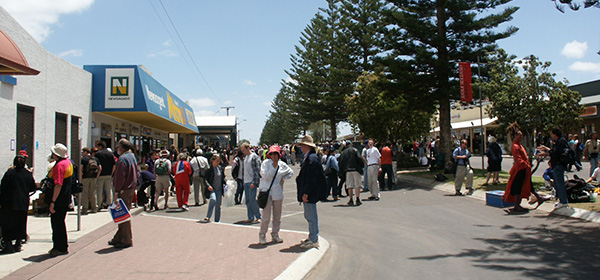The Federal Government has found its first testing ground for a trial of its new cashless welfare card.
In the hope of breaking the cycle of alcoholism and domestic violence prevalent in the small community, an agreement has been reached between the government and the Mayor of the South Australian town of Ceduna to trial the Healthy Welfare Card from February next year.
Ceduna has been heralded as an ideal target for testing, because it has an alcohol-related hospitalisation rate that is 68 times the national level. The community also had 4500 admissions to its ‘sobering up centre’ – even though the small community consists of only 4000 people.
According to the Parliamentary Secretary to the Prime Minister Alan Tudge, it is hoped that the trial will help to address the high rate of alcohol-related illness in Ceduna.
“We’re very happy to support what we think will be a huge improvement for our community generally,” said Mayor of Ceduna Mr Allan Suter. “The principal concern we were trying to address was the very sad situation where a very small minority of people are spending the bulk of the benefits that they receive on the purchase of alcohol or gambling services.”
Welfare recipients in the community will have 80 per cent of their benefits placed in a cashless debit card, with the rest deposited into an ordinary cash account. This means that participants will still have $60 to $150 in accessible cash available to them each week, depending on their circumstances.
The Government has said the card will not be aimed solely at the Indigenous community, but rather would affect all welfare recipients in the areas participating in the trial.
“This was always supposed to be a trial which will cover high welfare communities where there are serious alcohol and drug problems. That’s the intent,” said Mr Tudge. “Overall, the key objective is to reduce the harm caused by welfare-fuelled alcohol, gambling and drug abuse. And we’re hoping that those harm indicators will decline over time.”
Age Pensioners and veterans will also have the option to volunteer for the cashless card, in an effort to protect them from becoming targets for criminals looking to swindle them out of their cash.
“[And] I believe that many people will,” said Mr Tudge. “Because certainly amongst some communities they might get targeted or humbugged for money if they’re the only ones that have an access to money there.”
The Federal Government is still negotiating with the communities of Halls Creek and Kununurra in Western Australia about participating in the trial.
State and federal governments have also said they will provide additional funding to the community to assist the townspeople with substance abuse education and to help improve their job prospects.
Read more at www.abc.net.au
Read more at The Australian
Read the transcript of Michael Brissenden’s interview with Alan Tudge.
Read the transcript of Sarah Sedghi’s interview with Allan Suter.
Opinion: Could this be a positive step?
If correctly implemented, the Healthy Welfare Card could be an effective weapon in the fight against drug abuse and domestic violence.
There is little doubt that there are many welfare recipients in poorer and middle-class communities who could actually benefit from such a scheme. And although this trial is a ‘blanket’ test, if correctly targeted at specific welfare abusers, we could see positive results through breaking the cycle of alcoholism and violence.
But how to target those who need it most, without making this cashless welfare card something that all welfare recipients and pensioners are forced to use, is a question that still needs to be answered. And that solution should be a primary concern for government and community leaders throughout this trial.
Orwellian paranoia aside, this system could be a positive step towards rehabilitating and retraining those who do misuse taxpayer-funded welfare payments. Especially when this misuse leads to the physical abuse of spouses, partners and community members, as well as alcohol-related illness and crippling debt incurred through gambling addiction.
What do you think? Is the Healthy Welfare Card a good idea? Or do you worry that, should such a scheme become all encompassing, that the rights of those who do not misuse their benefits will come under unnecessary government scrutiny and control? Will you be affected by the implementation of the cashless welfare card? Would you volunteer for the ‘protection’ being offered through signing up for such a system?

